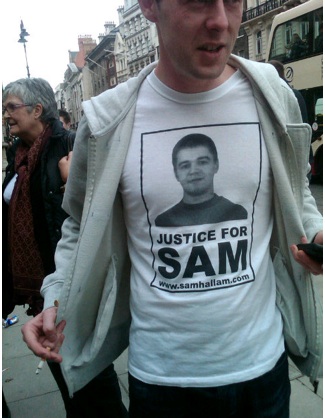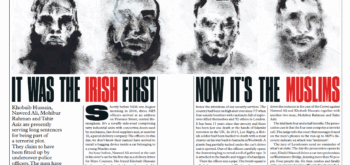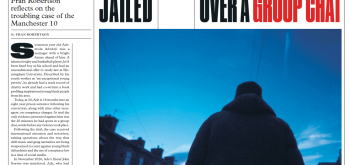Last week, those of us involved directly or indirectly in the miscarriage of justice world were celebrating that rare event – the decision by the Court of Appeal to quash a conviction where someone has maintained innocence from outset, and where it is clear that this person should never have been convicted in the first place. This week, we are asking ‘Where now for the wrongful conviction of innocent people?’
- This article is written by both Julie Price, director of Cardiff Law School Innocence Project, and Dr Dennis Eady, founder of South Wales Against Wrongful Conviction and case consultant to Cardiff Law School Innocence Project.
Post mortems of the police investigation will rightly follow. The CPS may now be admired for not opposing the appeal – that other rare commodity in miscarriages of justice: a commonsense (albeit late) decision. Sam Hallam can never get back those precious years, and he’ll be indelibly scarred.
Sam’s family are paying tribute to the CCRC, a welcome encouragement for an organisation recently on the receiving end of a battering from a variety of sources.
As a university innocence project, a ‘happy ending’ like Sam Hallam’s gives us a boost too; it gives us hope. But very soon we will return to face gargantuan hurdles on our 12 Cardiff cases, and pessimism and despair will return by the bucketful.
Three aspects of the Hallam story strike a particular chord with us.
- Timescales
- Family and campaigner support
- The apparent lack of an ‘agnostic search for the truth’ on the part of the police
Inexcusable delays
Stating the obvious, even with Sam’s large and vocal campaign, he still spent a disgraceful seven years in jail. Setting aside why he was convicted in the first place, why did it take over three years for the CCRC to investigate, and why then was it a further nine months before the appeal was heard? Even the pragmatists out there surely don’t think this timescale is acceptable.
At Cardiff last week we brought to the CCRC’s attention something that is, in our view, wholly unacceptable. In July 2010, we simultaneously submitted our original Cardiff Six cases to the CCRC, following five years of investigation by us, and as part of a ‘learning experiment’. Five of those cases were accepted by the CCRC for ‘full review’, meaning that we had raised sufficient new concerns that the CCRC would warrant reviewing.
We were pleased, and relieved. However, one of the six was rejected as raising nothing new. Ironically (and to neatly demonstrate the absurd consequences of needing ‘new’ evidence) that was our only case that the CCRC had previously referred to the Court of Appeal. So clearly the CCRC had thought the conviction may be unsafe. To be fair to the CCRC, they had previously commissioned an independent police investigation (as in the Hallam case), which revealed appalling errors and anomalies. However, despite this, the Court of Appeal rejected the appeal in 1999. (We could write volumes on why we consider that decision was totally unsound, and why our client remains convicted on the flimsiest of evidence, but that’s another story).
If the Court of Appeal decides that a conviction is safe in a referred case, then the CCRC plays no further part unless a new submission is made to them. In the past, perhaps in bolder times, a case may have been ping-ponged back to the Court of Appeal. In particular, this brings to mind the famous case of Cooper and McMahon: refused five times by the Court of Appeal, but overturned in 2003 on the sixth appeal hearing, following a successful submission by eminent solicitor Gareth Peirce to the CCRC.
Returning to our sixth Cardiff case, rejected in 2010 by the CCRC, in 2011 we found out that in January 2011 the Court of Appeal had discredited the evidence of one particular ‘expert’, whose evidence was fundamental to our case. That judgement of the Court of Appeal contains a request to the CCRC to look again at all cases involving this particular expert. So in July 2011, on the first anniversary of our six-case submission, we confidently re-submitted this application to the CCRC on behalf of our client. We specifically referred to the Court of Appeal’s direction in the January 2011 case. The CCRC thanked us for bringing this to their attention, as they had not previously been aware of it (we have since questioned the channel of communication between the Court of Appeal and the CCRC, because this surprised us). We asked the CCRC to expedite our submission, given the Court of Appeal’s concern about this ‘expert’, but they did not respond to this request. Instead, we had the ‘standard’ letter saying that our case had been accepted for full review, and that it was in the CCRC queue for allocation to a case review manager.
They estimated this would take six to eight months from the date of submission. Last week, almost 10 months later, we had still not received notification of allocation to a case review manager. So we wrote to the CCRC voicing our concerns, and we received confirmation of allocation by return, presumably prompted by our letter. Once the CCRC review starts, will it take another three years, as in Sam Hallam’s case? We think this is unacceptable.
2. Family and campaign support
Does this particular Cardiff case referred to above have a campaign behind it? Ironically, in past years there was huge momentum, including two cutting-edge prime-time television documentaries. But our client is now reluctant to seek further publicity for his case.
Sadly, he feels that he came under such criticism from the Court of Appeal because of the media campaign behind him, that he daren’t risk it again. We have also met several television journalists who know the case intimately and consider there to be no doubt as to our client’s innocence. One feels deeply aggrieved at what he considers to be a slur upon his professional integrity by the Court of Appeal when he gave evidence. The trial solicitor feels similarly ‘put down’.
This journalist is now retired, but is keenly watching our submissions all these years later with a view to ‘clearing his own name’ when (and not if, in the opinion of many) this case is overturned. The original trial solicitor, now 25 years older and wiser, is supporting us pro bono because he feels so strongly that this is a gross miscarriage of justice.
Sam Hallam attributes his survival in prison, knowing he was innocent, to the campaign of family and supporters. Richard Foster, chair of the CCRC, is worried about cases that may slip off the radar – the unfortunate ones who don’t have families and big campaigns behind them.
We ‘insiders’ are very familiar with names such as Ray Gilbert (supported by Bruce Kent, among others) and Sue May (who, despite an extensive campaign and a general acceptance that hers is a ‘classic’ miscarriage of justice, remains a convicted murderer). We’re not so sure that they are yet household names, along the lines of Barry George. There are many names on the INNOCENT website and elsewhere, listed like a perverse ‘wall of shame’ against our system. Some have their own websites. Each has his or her own compelling story. Of course, we don’t know for certain that they’re innocent, but the current rules of the game don’t give them even a fighting chance to demonstrate that they may well be.
The Innocence Network UK’s 45 case dossier announced ahead of its symposium contains some less well-known names, many off anyone’s radar, being considered by other universities that all face the same frustrations as we do at Cardiff.
Cardiff’s anonymous roll-call includes:
- Client 1: did not speak English properly at the time of his conviction. His family are overseas. He has just one friendly face to support him – a volunteer prison visitor who selflessly visits him every Friday. His case is currently with the CCRC.
We think we’ve blown holes in every aspect of the evidence that convicted him, to raise significant doubt. But some of this isn’t “new”. It was there all along. The concept of ‘reasonable doubt’ goes out of the window after someone’s been convicted, along with commonsense, in favour of protecting the integrity of the jury verdict. As educators, we would find it highly embarrassing to try to justify a system that, despite bizarre consequences, continues to jealously guard the concept of jury infallibility, and ‘integrity’ of the system. Surely the popular meaning of the word “integrity” is something different. Innocence projects teach our students to judge integrity for themselves. - Client 2: was homeless in London at the time of his conviction, having recently moved here from South Africa. His family and friends cannot afford to visit, and he has lost contact with them.
- Clients 3 and 4: homeless, easy targets, unpopular anonymous misfits without a voice.
And so on.
The police investigation
Why was Sam convicted in the first place on such flimsy evidence? This strikes a chord with many. ‘Case construction’ is something we are seeing in at least half of our cases at Cardiff, where the police build up the evidence to support their favoured defendant, casting aside any ‘agnostic search for the truth’. This phrase, commonly used by forensic police consultant Des Thomas who currently assists many of us with our investigations, should not come back to haunt any police force that is committed to convicting the right person. Overzealous target-driven policing must be a key cause of miscarriages of justice. Both the police and the CCRC must feel the pressure of budgetary constraints and targets. At the JusticeGap’s Wrongly Accused launch, Gareth Peirce responded to the CCRC by saying it was ‘intensely disturbing’ if they are ‘budgeting the number of innocent people who can get their cases before the Court of Appeal’.
Conclusion
At the same time as welcoming the Sam Hallam decision, and the CCRC’s decision to refer this to the Court of Appeal, we should also highlight such highly-charged notorious cases as that of Jeremy Bamber, which raises questions about the CCRC’s consistency of referral. The Bamber case is nothing to do with Cardiff, and we have not read the CCRC’s Final Statement of Reasons. However, one of the authors of this piece has followed this case closely and maintains that over the years the original, inherently unlikely, case against Mr Bamber has been weakened beyond recognition.
From whichever angle you approach the Bamber case, if we’re talking about the ‘integrity’ of our system, and the ‘safety’ of convictions, then perhaps we need to question why the CCRC has recently declined to refer his case back to the Court of Appeal. They say:
‘Matters of pure speculation or unsubstantiated allegation constitute neither new evidence nor new argument capable of giving rise to a real possibility that the Court of Appeal will quash the conviction. Neither can such a real possibility arise from the accumulation of multiple unsubstantiated allegations.’
Bamber’s solicitor (Simon McKay) responds (The Telegraph, April 26th 2012):
‘In my view the Commission have not applied the proper test for determining whether a case should be referred back to the Court of Appeal. To be clear: four independent and supremely qualified experts provided opinions that fundamentally undermined the Crown case against Mr Bamber and the safety of the convictions. The evidence was credible, inherently believable and gave rise to cogent admissible grounds of appeal that may have affected the jury’s verdict. This is sufficient for the case to be referred back: whether the conviction is in fact subsequently quashed is a matter for the Court of Appeal. The Commission may have usurped the court’s function.’
Unless we’re applying double standards about ‘safety’, Mr McKay’s assertions are correct, aren’t they?
He goes on to say: ‘In the final analysis, whatever the notoriety that surrounds this particular case, whatever the public perception, the law applies equally to Jeremy Bamber as it does to all of us.’
He’s surely right, isn’t he? If there’s new evidence or argument, which there clearly seems to be in the Bamber case, why does the CCRC not refer the case to the Court of Appeal rather than act as decision-maker itself on this?
So, returning to Sam Hallam. Where next for him? Counselling, undoubtedly, followed by a successful compensation claim, hopefully.
But where next for our system?
Understandably the CCRC will argue that they did an excellent job for Sam, even if it took longer than it should have. Only the CCRC will know how much work was done by the campaign group and the media ahead of the submission being made, to ensure that it was accepted by the CCRC in the first place, another common valid complaint forwarded by critics. The CCRC cannot enjoy the barrage of criticism it has faced, particularly over recent months. The CCRC readily acknowledges that the system isn’t perfect, and we all realise that perfection is unachievable. If the CCRC blames causes other than its own workings (funding, statutory restrictions, the Court of Appeal’s approach, or more likely a combination of these and other factors), then is now, in the wake of the Hallam case, the time for the CCRC to be proactive, and itself to call for comprehensive reform discussion?
Gareth Peirce said at the Justice Gap launch that the CCRC was in ‘an ideal position’ to challenge the court or to take a judicial review of ‘the unlawful restriction on your powers’ and ‘if necessary’ go to the European Court of human rights’. ‘You have the data. You have the data to cause a change.’
In fact, we would go a step further and suggest that if the CCRC is not the organisation that can productively call for reform discussion that may lead to change, then who or what is? There is no-one else, and that duty must be incumbent upon them, regardless of funding issues.
Instead of responding to Gareth Peirce, ‘I wish we felt as powerful as you think we are,’ might Alastair MacGregor (deputy Chair of the CCRC), post-Hallam, be reflecting with his colleagues upon a follow up?
Might the Sam Hallam case be the catalyst that persuades the CCRC to flex its potentially very powerful muscles and say: ‘The time has come for a comprehensive review?’ Founded in commonsense, is this a reasonable thought, or a naive one that would involve upsetting too many applecarts?
Surely the problem of the wrongful conviction of innocent people is a national scandal of even greater proportion than phone hacking or the MPs’ expenses debacle, and we can fairly be asking for Leveson-type funding for this to be properly looked at. We think that’s eminently reasonable and smacks of commonsense, not naivety.







A detailed critique of the Court of Appeal judgment in the case of Oliver Campbell